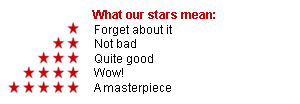|
|
| Help | |
| You are here: Rediff Home » India » Movies » Reviews |
|
| |||||||||||||||||||||||
|
| |||||||||||||||||||||||
Debutant director Kathaka Thirumavalavan's Tamil film Ajanthaa is unique in many ways. It is supposed to be the first film to be simultaneously shot in four languages -- Tamil, Telugu, Malayalam and Hindi -- in the history of Indian cinema.
Music is by Ilayaraja, who seems to be on a record-setting spree. He has composed nine songs for each version, thus totalling 36 tracks, all in a week!
Thirumavalavan, who was earlier director Pavithran's assistant, has also written the story, screenplay and dialogue of Ajanthaa. Actor Ramana who made his Tamil film debut in Style is trying his luck as hero once again in this film. Incidentally, the name of the debutante heroine of the film also is Ajanthaa.
Ilayaraja, deviating from his sober style, has tried to introduce modern repertoire, and may be taking into account the current trends. But fortunately, not at the cost of melody.
The album kicks of with Engae irunthai, the soulful outpourings of two singers elegantly rendered by K J Jesudas and Manjari. Isai (music) is the theme of Vali's lyrics. The track is an ethereal blend of Vali's pure poetry and Ilayaraja's sheer melody. Rendered in Jesudas's resonant but gentle voice combined with that of Manjari's free-flowing one, the haunting number takes you back to an era when melody reigned supreme. What gives the track an additional allure is the awesome instrumentation comprising violin, guitar and saxophone spells.
The same number is repeated twice later in the album with slight variations in the lyrics, and instrumentation. The second version is couched in anguish and pathos. Chendamelam is added to percussion along with nadaswaram passages and payal sounds in the interlude. But the Devdas style coughing towards the end makes it frivolously dramatic. The same track replicated later by the composer himself is equally enchanting. The maestro shifting slightly from his languorous style has infused more energy in his rendition.
Thoorigai indri, a fast paced number by Manjari, begins with violin ensemble and flute prelude. In fact, violin dominates the instrumentation in almost all the tracks, even in the last one where it sounds out of place. Thirumavalavan does creditably well here as a lyricist too. It paints a picture of the girl Ajanthaa, awestruck by the beauty of this world.
Yaarum thodatha onru, another melodious duet by Shreya Ghosal and Ilayaraja, is about the awakening of love. Shreya sounds like screeching while going into high octaves, otherwise her voice smoothly blends with the maestro's. But the violin-saxophone-flute ensemble is the highlight of this track. Pa Vijay's lyrics full of meaningful metaphors convey the spirit of the song.
Then comes Aaye giridhar a very brief Hindustani classical Keerthanii (devotional piece) praising Lord Krishna, sonorously rendered by Madhumitha in her sugar-coated voice.
In Kayyiloru keyboardum which follows the lyricist Mu Mehtha seems to have a dig at the umpteen mushrooming music troupes who are very much in demand for marriages and birthday celebrations. While the composers toil to create the music, the singers get all the benefit, he rues. He also pokes fun at their faulty rendering of Hindi songs. A lacklustre hip-hop -- mild rap combo, obviously not the maestro's cup of tea.
Ilamai itho by Manjari coming up next starts like a foot tapping item number with western instrumentation. Then the rhythm changes, beats slow down and sentimental melody takes over. There is an interlude of extensive swara permutations and fast dance beats which reach dizzy heights towards the end. This combined with the resonant clapping creates the image of a dance performance on the stage. Lyrics are by Snehan.
Yaarukku yaarendru by Unnikrishnan is a ballad with a blend of Indian and western instrumentation, a favourite ploy successively employed very often by Ilayaraja. Senthilkumaran's lyrics clothed in tenderness are a celebration of kadhal (love). Harmonius orchestration gives an added appeal to Unnikrishnan's mellow but fast paced rendition.
Poduda sakkai podu, the concluding piece with lyrics by Muthulingam and rendered by Swetha and Tippu is the odd man out in this album. The tabla, guitar and violin interlude stands out like a sore thumb in this pedestrian piece with suggestive sounds and sensuous phrases. The composer tries his hand at peppy music but fails.
Ajanthaa is undoubtedly a good album.
Rediff Rating: 

|
|
| © 2007 Rediff.com India Limited. All Rights Reserved. Disclaimer | Feedback |